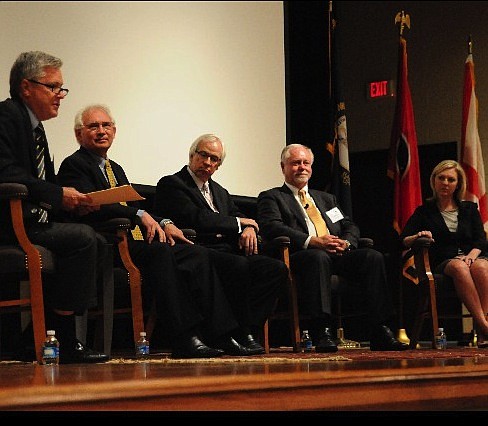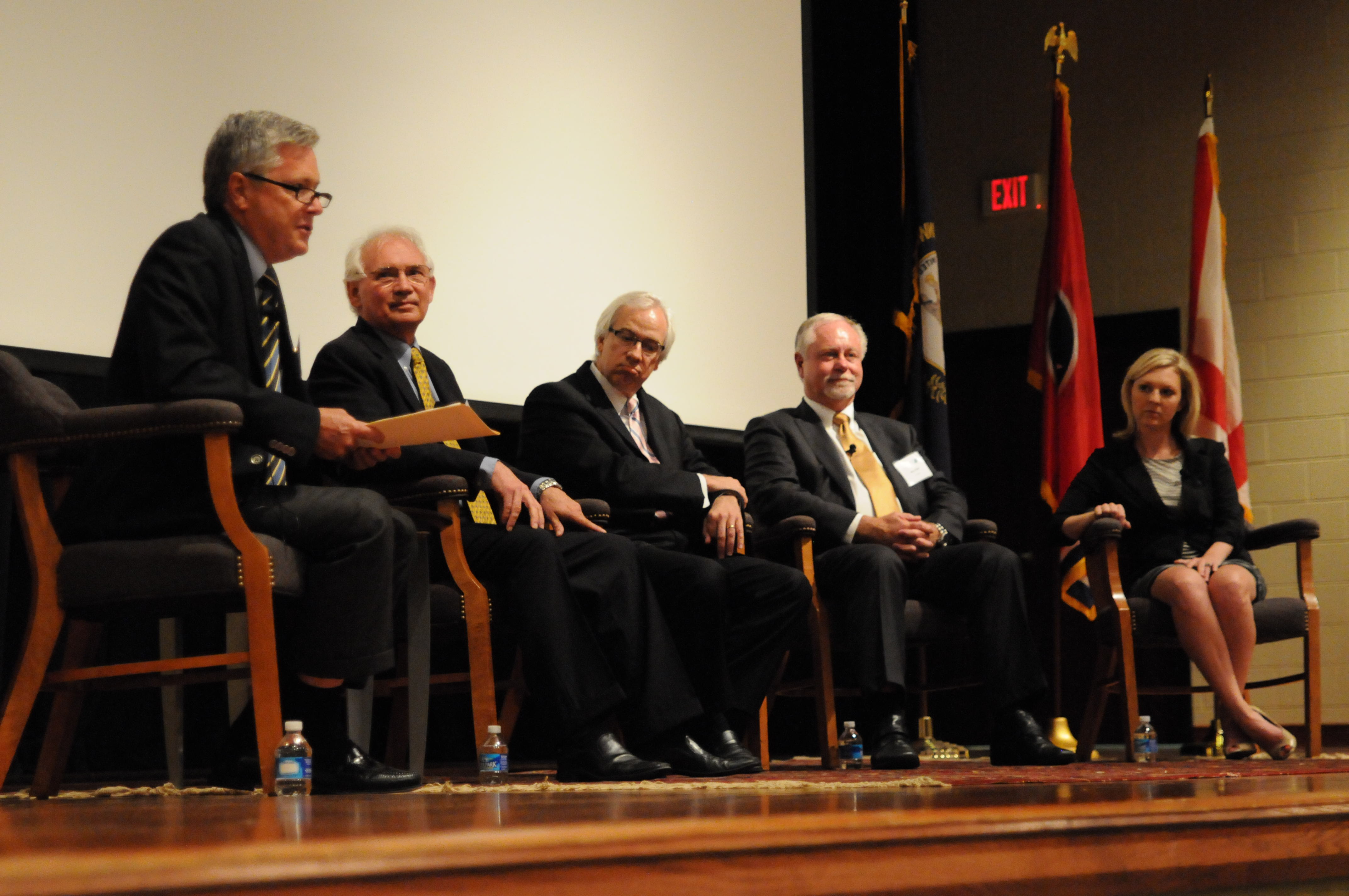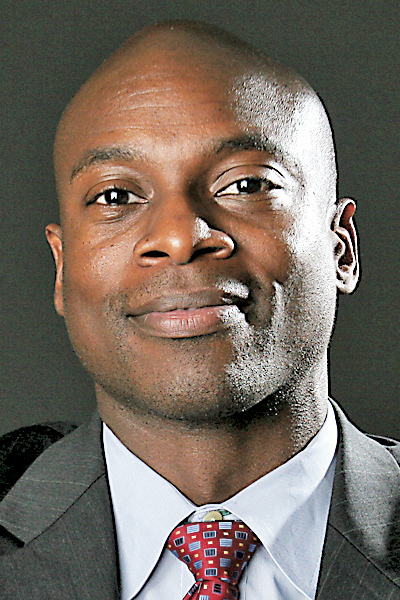Wade Hinton grew up in Chattanooga, but he couldn't wait to flee, counting the days until he completed high school, he told a packed room of scientists, CEOs and municipal officials Wednesday at the University of Tennessee at Chattanooga.
Reared in the inner city by a single mother some decades ago, Hinton was motivated to get educated, because that education was his ticket out of the smoggy, dangerous city with its limited prospects and declining economy.
"When I left Chattanooga after high school, I never thought I would return," Hinton said at the opening of a panel on Chattanooga's rebirth as an economic powerhouse. "And why would I?"
Why, indeed. Chattanooga's downtown was empty and dead, covered in enough haze to keep respiratory doctors busy around the region, and unsafe after dark. U.S. Rep. Chuck Fleischmann, R-Tenn., was just starting a law practice in 1987, and things were much the same.
"I would come out of my office at night, and the city was dead. It was quiet. There was nothing going on," Fleischmann said.
But Hinton came back, first as the Chattanooga-based corporate attorney for Volkswagen's new $1 billion plant at Enterprise South, then as the city attorney under Chattanooga Mayor Andy Berke, who oversees the ongoing Chattanooga Renaissance that gained steam under his predecessors.
Things have changed from the 1970s and 1980s, when the succession of shuttered foundries and factories rocked the town long known as the Dynamo of Dixie.
Chattanooga's comeback story took center stage Wednesday during the 2-day Tennessee Valley Corridor Summit at UTC. The Scenic City may not have the research facilities of nearby Oak Ridge or Huntsville, but Chattanooga outperforms the competition when it comes to applying science directly to industry.
Take Max Fuller, co-founder of trucking giant U.S. Xpress. The idea of big noisy trucks trundling down the road may not seem sexy or technologically advanced, but under Fuller the company has consistently surprised industry watchers with groundbreaking features like satellite-guided navigation, collision avoidance systems and side skirts for aerodynamics.
"Chattanooga isn't known for being one of the most technological places on the planet, but we have a lot of it," Fuller said. "Today we have the most technologically-advanced trucks on the highway."
In concert with the Chattanooga-based UTC Sim Center, Fuller spearheaded the effort to study the feasibility of side skirts for trucks, which improves aerodynamics anywhere from 12 to 14 percent and today reduces the company's fuel cost by about $40 million.
His engineers essentially built the satellite navigation software in the 1980s that today is an industry standard, improving the trip time between the east and west coasts to one week from three weeks.
And the prepaid debit card system that he built for his drivers to use when buying fuel has spun off into its own entity, now called TransCard, which today on its own is the largest technology company in Chattanooga. The company today has hundreds of employees and is one of 10 Mastercard processors in the U.S.
"We are the smallest but we're the fastest," Fuller said. "We're beating the big companies with sub-second response by almost three to four times what they're doing."
The UTC research is part of the university's growing effort to connect students with the community and new opportunities, said UTC Chancellor Steve Angle, one of the co-hosts for the Corridor summit.
Fuller can afford to innovate because he brings in sales of $2 billion per year, boasts 9,200 trucks and 11,000 employees, but what about smaller companies? Nearly every decent-sized city has a large company with an R&D lab, but many cities still struggle to fund new ideas and young, unproven entrepreneurs, officials explained to members of the Tennessee Valley Corridor.
Though Chattanooga has lagged in small business job creation by some measures, he has outperformed many of its peers when it comes to raising capital in recent years to jump start new companies, said Tiffanie Robinson, director of Waypaver.
Robinson, who also heads up the $2.5 million Jump Fund which is focused on investing in women-owned businesses, said her fund alone had raised more than the combined angel landscape of Oak Ridge and Knoxville.
"Our fund has raised more money than those two cities combined, and we're very proud of that," she said.
That doesn't count the tens of millions also raised by the Chattanooga Renaissance Fund, Lamp Post Group, and others, which augment and work with the Jump Fund to find investible businesses.
Such strategies have already started to yield dividends, said Mike Bradshaw, executive director of the CoLab accelerator.
In one case, several of the business principals from recently-sold Quickcue, which OpenTable purchased for $11.5 million, have already started another company. This one is called ZipFlip, and is focused on making it easier to buy a used car.
Plus, "the acquisition resulted in bringing new talent, and keeping the technical team behind Quickcue here," he said.
Some of the outside interest into Chattanooga's technology sector comes from the citywide gigabit Internet network, Bradshaw said, which could give Chattanooga a further boost as other cities develop their own ultra-fast broadband installations.
"It is true, there are other cities around the country now that are developing their own gig networks, you might think, oh, that means the door is closing on Chattanooga," Bradshaw said. "But wow that they are we're in a position to say that if this is happening in your community, happening across the country, come here and experience what's coming. So this door is just opening up."
Contact staff writer Ellis Smith at 423-757-6315 or esmith@timesfreepress.com with tips and documents.



